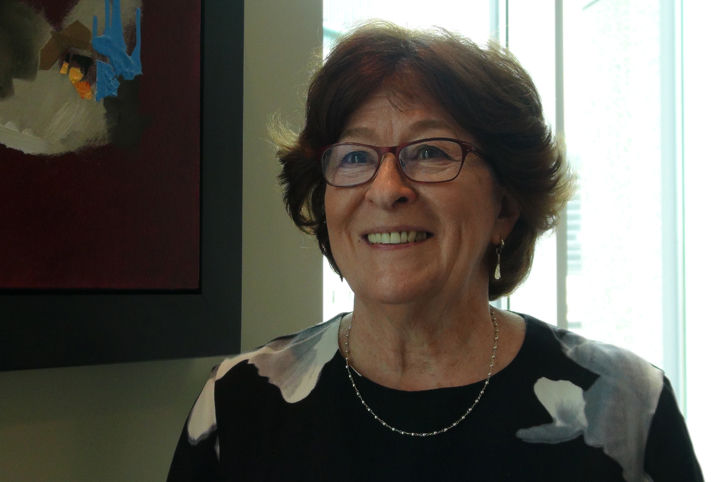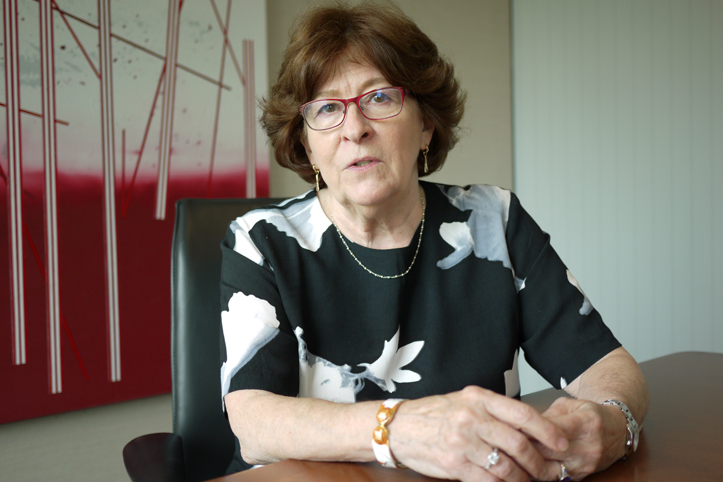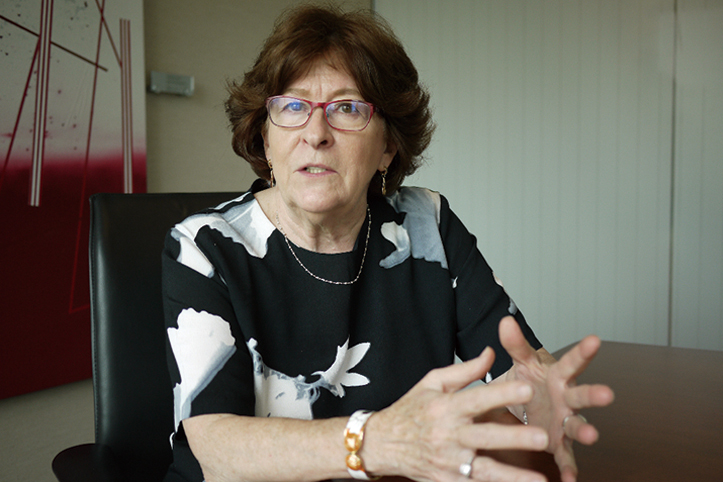Madame Justice Louise Arbour has been a leading figure in the global constitutional and legal protection of human rights, civil liberties, rights of victims of war crimes, and rights of people whose rights were suppressed. Throughout her career as, inter alia, law professor, judge in Canadian judiciary, the Chief Prosecutor of major international tribunals, and UN High Commissioner for Human Rights, she has been bringing her legal expertise for the achievement of justice, overcoming substantial political and institutional inhibitions in the fields with insights, creativity, determination and persistence. Recently she has been devoting her efforts in conflict-prevention on an even grander scale, leading her team in field-based analysis and advice-giving, drawing the world’s attention to the corners that might suffer from upcoming conflicts.
With primary academic speciality in criminal law, Louise Arbour has solid expertise in criminal law and procedures. One of her early publications, Criminal Procedure: Cases, Text and Materials (Toronto: Emond-Montgomery, 1980, with Larry T. Taman) – which was particularly strong in criminal investigative process, involving searches, writs of assistance, arrest, electronic surveillance at the interfaces with controlling of police powers and the protection of the rights of the suspects –, demonstrated the ground that prepared her for excellence in her ensuing roles.
While serving as a Judge of the Court of Appeal for Ontario, Louise Arbour headed the Commission of Inquiry into certain events at the prison of Women in Kingston, involving the use of an all-male institutional emergency response team (IERT) in cell extractions and strip searches, followed by prolonged segregation and deprivation of basic amenities in correctional institutions. What were at issue included the rights of female inmates, including those of aboriginal ethnicity. As Louise Arbour stated in the opening paragraphs of her report: “The incidents that gave rise to this inquiry could have gone largely unnoticed. … Until the release of the report by the congressional investigator, the correctional service of Canada had essentially closed the book on these events.” She pointed to the institutional failure of Canadian Correctional Service, which resulted in the imposition of prolonged administrative segregation, and recommended for its legal regulation in line with the Canadian Charter of Rights and Freedoms, including placing judicial oversight or at least independent adjudication over the discretionary segregation. The report also recommended sensitive handling of rights of Women, including putting cross-gender staff in place and creation of Deputy Commissioner for Women to, inter alia, exploring the desirability of unification of all correctional services for women offenders across the country. Measures culturally sensitive to aboriginal women in terms of staff, teachings and facilities were also necessary for addressing racism in criminal justice institutions.
While on the bench of the Court of Appeal for Ontario, or later of the Supreme Court of Canada, Louise Arbour contributed to judgments advancing the protection of human rights in several areas of the law. The first such area concerned with prisoners’ right to vote. In Sauvé v. Canada (Attorney General) (Sauvé No. 1), the Court struck down the prisoner disenfranchisement law. Judge Louise Arbour was the leading voice in advocating resistance of the temptation to trivialize the infringement of prisoners’ rights as insignificant. In her view, “[b]y the time the Charter was enacted, exclusions from the franchise were so few in this country that it is fair to assume that we had abandoned the notion that the electorate should be restricted to a “decent and responsible citizenry,” …… in favour of a pluralistic electorate which could well include domestic enemies of the state.”
In the area of the educational right of children with special needs, Judge Louise Arbour has been a strong advocate for placing as far as possible disabled children in integrated classrooms, while still being reasonably capable of meeting their special needs. In Eaton v. Brant County Board of Education, she viewed placing disabled children in special classrooms violated their equality rights under the Canadian Charter, because “when analyzed in a social, historical, and political context, such placing constituted a disadvantage, thus discriminatory.” This led Judge Arbour to advance the view that a presumption of inclusion should be applied to education of children with special needs. On appeal, the Supreme Court of Canada reversed Judge Arbour’s ruling on grounds of mootness and more relaxed standard of inclusiveness, but the merits of Judge Arbour’s reasoning remain persuasive on this issue.
While on the bench of the Supreme Court of Canada, Justice Arbour was a strong supporter of the justiciability of socioeconomic rights. In Gosselin v Québec (Attorney-General) she argued for justiciability of the positive rights to the basic means of subsistence within s. 7 of the Canadian Charter. In her 2005 lecture “Freedom from Want - From Charity to Entitlement” she argued for the indivisibility of human rights. While serving as the UN High Commissioner of Human Rights, she advocated the adoption of the Optional Protocol to the International Covenant on Economic, Social and Cultural Rights (ICESCR).
In 1996, Madame Louise Arbour was appointed to the posts of Chief Prosecutor of both the International Criminal Tribunals for the former Yugoslavia (ICTY) and Rwanda (ICTR), serving that role for both the Tribunals at the same time. In the wake of the humanitarian atrocities in the conflicts in former Yugoslavia and Rwanda, the Security Council of the United Nations established the war crime tribunals to bring the perpetrators to justice. Such international attempts were so new that the mandates had to be realized with ingenuity and determination. The Prosecutor’s offices were short of staff and resources, while the NATO / western powers were treading carefully so as not to interrupt the delicate situations, and the Balkan States were in general hostile to the Tribunal’s tasks.
The burden to realize the war crime tribunals’ mandates fell on the shoulder of their Chief Prosecutor. In the case of ICTY, while the first Chief Prosecutor was successful in promoting the profile of the Tribunal, it was Louise Arbour who secured the effective performance of ICTY’s mandate, by, inter alia, increasing its funding, developing new investigatory powers, and introducing legal practices that allowed the continued development of prosecutable cases. The most significant achievements, however, lied with Arbour’s role in securing the arrest of those suspect of committing the war crimes. On a mega level, Arbour was successful in further promoting the ICTY’s public profile, by cultivating partnership with the media. Moreover, she successfully acquired the cooperation of the local authorities in the Balkans, by inducing their cooperation as a condition of obtaining financial assistance from the western governments. On a minute level, she used the legal tactics such as ‘sealed indictments’ to reduce possible political constraints from the local authorities and to add an element of surprise.
As a result of Arbour’s strategies, the number of arrests made by the ICTY more than tripled during her reign. Not only so, her efforts resulted in the transfer and indictment of high-profile suspects who were considered impossible to be brought to justice, such as Slobodan Milošević, who was indicted when still serving the head of state of the Federal Republic of Yugoslavia (FRY). As such, Louise Arbour laid good foundation for the realization of international criminal justice and the development of international criminal law, which continue its influence in the fora such as the International Criminal Court (ICC) or other national tribunals.
After working in a wide range of fields where human rights face their most severe challenges, in the past decade, Louise Arbour focused her energy in the work of conflict-prevention and high-level advocacy for peace and security, as she took on the role of President and CEO of International Crisis Group (ICG), a non- governmental organization based in Brussels. Over the years, the ICG has established itself as the leading independent, non-partisan source of analysis and advice on conflict-prevention and resolution. What distinguishes ICG, with its many teams of experts stationed in all parts of the globe, is its unique combination of field-based analysis, practical policy prescriptions and high-level advocacy. Emphasis on prevention sees the ICG issue early warnings and bring the world’s attention to forgotten conflicts and peacebuilding processes, such as those in Colombia, Sri Lanka, and Darfur, Sudan.
In the course of her public and NGO services Louise Arbour continued her writing and over the years she has been contributing to the cutting edge of doctrinal developments in legal studies. Her views on the inter-linkage of peace and justice in post-conflict communities, and her contributions to the doctrinal foundation of the Responsibility to Protect (R2P) are particularly noteworthy, not least for a sense of practicality no doubt drawing from her extensive experiences with international justice, reconciliation, and conflict-prevention.



